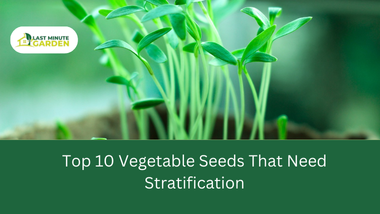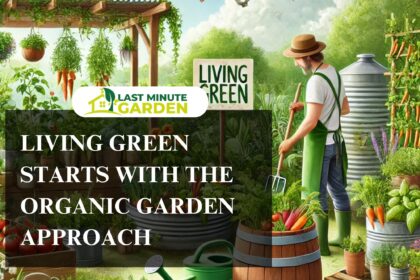Did you know that some vegetable seeds need a little extra care before they sprout? For certain plants, just planting the seeds in the soil isn’t enough. These vegetable seeds that need stratification require a specific process to simulate winter conditions to ensure they germinate successfully.
Stratification is the practice of breaking seeds’ dormancy to help them germinate by manipulating temperature and moisture to mimic the outdoor conditions under which they would grow naturally.
But which seeds need this process, and how do you do it right? Let’s explore the top 10 vegetable seeds that need stratification.
1. Parsley
Parsley is one of the vegetable seeds that need stratification. Many gardeners find parsley challenging to germinate, but with stratification, you can give it a head start.
Parsley seeds have a tough outer shell, which means they benefit from a period of cold, moist treatment.
Place the seeds in a damp paper towel, store them in a plastic bag, and put them in the fridge for about 3-4 weeks before planting.
This process helps soften the seed coat, making it easier for the seeds to sprout once they’re in the soil.
2. Carrots
Carrot seeds are notorious for their slow germination. Although stratification isn’t always necessary, giving carrot seeds a cold treatment can lead to faster and more even sprouting.
Soak the seeds in water for a few hours, then place them in a damp cloth and refrigerate them for about a week.
After this, plant them in well-prepared soil, and you’ll likely notice a quicker emergence of those delicate green shoots.
3. Celery
Celery requires patience and the right conditions to grow, but a little stratification can make a big difference. Celery seeds are small and slow to germinate.
To speed up the process, place the seeds in a damp paper towel, seal them in a plastic bag, and store them in the fridge for 2-3 weeks.
Once they have had their cold spell, plant them in seed trays indoors, providing warmth and light to encourage growth.
4. Onions
Onion seeds benefit from stratification to ensure a more uniform sprouting process. Place the seeds in a moist paper towel, put them in a sealed bag, and refrigerate them for 10-14 days.
After this period, plant them in the soil and provide plenty of sunlight. The cold treatment helps the seeds overcome their dormancy, leading to stronger seedlings.
5. Spinach
Spinach loves cool weather, but its seeds often need a bit of encouragement to get started. For better germination rates, give spinach seeds a week-long cold treatment in the fridge.
Wrap the seeds in a damp paper towel, place them in a zip-lock bag, and store them in the refrigerator.
Once the week is up, plant them in the garden or seed trays, and you’ll see how this simple step helps produce a more vigorous crop.
6. Lettuce
Lettuce is another cool-weather crop that sometimes requires stratification for better results.
Its seeds can become dormant in warmer conditions, so a cold treatment can simulate the chill they would experience in nature.
Place the seeds in a damp cloth and keep them in the fridge for a week before planting. This method can lead to quicker and more uniform germination, giving you a head start on those tender greens.
7. Brussels Sprouts

These mini-cabbage lookalikes need a bit of cold to kick off their growth cycle. Brussels sprouts seeds benefit from a 2-3 week period of stratification.
Put the seeds in a damp paper towel, seal them in a plastic bag, and refrigerate them before planting. The cold period signals the seeds to wake up, ensuring a better start in the garden.
8. Beets

Beet seeds, or beet “clusters,” contain several seeds within one shell, making them tricky to germinate evenly.
To improve the chances of sprouting, try soaking the seeds overnight, and then refrigerate them for a week.
This treatment helps soften the hard outer shell and gives the seeds a jump start. After stratifying, plant the seeds directly into the garden for a more successful beet harvest.
9. Kale
Kale is a hardy green, but its seeds can benefit from a cold treatment for faster sprouting. Before planting, store the seeds in a damp paper towel inside a plastic bag, and keep them in the refrigerator for about 10 days.
This process tricks the seeds into thinking they’ve experienced winter, prompting them to germinate more readily when placed in soil.
10. Leeks
Leeks are known for their long growing season, which means starting them early is key. To ensure better germination, leeks benefit from a period of cold, moist stratification.
Store the seeds in a moist paper towel in a sealed bag and place them in the fridge for 2-3 weeks. This step helps speed up germination and allows you to get a head start on the growing season.
Vegetable Seeds That Need Stratification: Common Mistakes to Avoid
When performing seed stratification, some common mistakes can hinder the germination process. Here are things to avoid:
- Using the wrong temperature: Vegetable seeds that need stratification often require specific temperatures to mimic winter conditions. Using temperatures that are too warm can prevent seeds from breaking dormancy. Make sure to research the ideal temperature range for the specific seeds you are stratifying.
- Not sufficiently moistening the medium: Seeds need a moist environment during stratification, but not soaking wet. Too little moisture can cause the seeds to remain dormant, while too much can lead to mold growth and seed rot.
- Skipping sterile mediums: Using unsterilized soil or materials can introduce fungi or bacteria that might damage the seeds. It’s best to use sterilized sand, peat, or a paper towel to prevent contamination.
- Ignoring the time requirements: Different seeds require different durations for stratification. Stratifying seeds for too short or too long can disrupt their germination process. Always follow the recommended time frame for each type of seed.
- Overcrowding the seeds: Placing too many seeds in a small space can limit airflow and increase the risk of mold. Make sure the seeds are spread out evenly to allow proper ventilation.
Summary
Stratification may sound like an extra step, but for many vegetable seeds, it’s the key to a more productive garden.
From parsley and carrots to leeks and beets, these 10 vegetable seeds that need stratification show the benefits of a little pre-planting preparation.
You can ensure that your seeds get the best possible start by simulating the cold winter conditions that trigger germination.
For more gardening tips and tricks, stay connected, and let’s make your garden dreams a reality.





